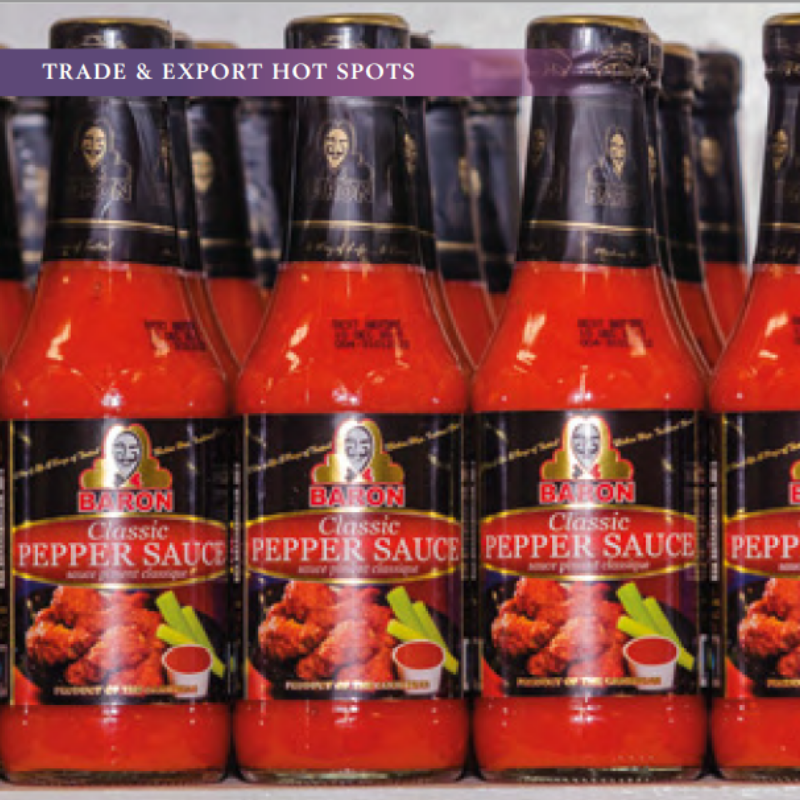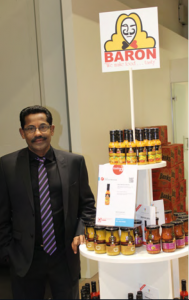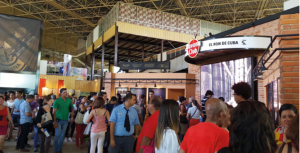A market of over 12 million people is nothing for Caribbean exporters to thumb their noses at. That’s the kind of market from which any company in the Caribbean Community (CARICOM) would benefit. So when CARICOM and Cuba signed a reciprocal Trade and Economic Cooperation Agreement 15 years ago, it provided exporters in the region with access to millions of potential customers. The reciprocal agreement, which focused mainly on trade in goods, gave duty-free or duty reduced entry to Cuba of specific goods such as fruit juices, sauces, condiments, seasonings, and clothing from the CARICOM region. While the agreement is now, more or less, inactive, several established companies have taken advantage of the opportunity of access to the Cuban market, though not without having to overcome several hurdles.
Baron Foods Limited, a St. Lucian manufacturing company with a Food Safety System Certification (FSSC) 22000 V3 certified product range of 165 condiments and beverages is one such company.
Five of its condiments and sauces have been approved and accepted for sale in the Cuba market and the company is awaiting a confirmed order from TRD Caribe, one of the largest food and beverage distributors in Cuba. It’s also eyeing the hotel and tourism sector and retail stores.
Chief Executive Officer Ronald Ramjattan says it would have been remiss of his 24-year-old company, which is already in several other markets in the region, not to have looked at Cuba. Cuba is a new and emerging market with over 12 million inhabitants sharing a similar culture and food preference with the rest of the Caribbean people, he says. The Cuban market is similar in many aspects to the rest of the Caribbean, even though the Spanish influence does have its fair share of difference from us.
As Ramjattan acknowledged, the benefits are significant for any CARICOM exporter. They include having access to a large, regional market that American competitors can’t take advantage of, due to the longstanding US embargo against trade with Cuba. Even though from January 2015, it became possible for Americans to visit Cuba without a specific licence if the visit falls under any of 12 categories, there are still limits to the amount of goods that can be brought into the country in luggage, and shipped by boat from abroad. The challenges to breaking into and competing in the Cuban market, however, are numerous.
Cuba has one of the world’s few remaining centrally planned economies, with the government controlling 90 per cent of the economy. All trade with that country must be conducted through the state. Goods can therefore only be imported into Cuba by government entities and joint ventures holding permits for the goods in question.
The high cost of transportation (both sea and air); legal and institutional differences; and insufficient finance and credit mechanisms are some of the other major obstacles. Added to the strict rules which guide the country’s import policy, language was a hurdle for Baron Foods.
Spanish being the spoken language is one of the main barriers we had to face. Selling terms are completely different as they are looking for three to six-month credit facilities, says Ramjattan.
Kapril Industries, however, did not have the language barrier problem. The cosmetics manufacturing company, established in December 2002 by a group of chemistry professionals in the Spanish-speaking Dominican Republic, has been exporting haircare and personal care products to Cuba for the past two years.
The Dominican Republic’s proximity to Cuba, the two having similar markets for hair products, and the fact that residents of both countries speak the same language, proved to be an advantage for Kapril.
The reason for choosing Cuba as a market is that we share similar ethnic groups, being nearby islands and therefore similar characteristics. Also, we share the same climate of the Caribbean region and our products are designed with a tropicalized formula, says Chief Executive Officer Julia Jimenez, who is also the first Vice-President of the Association of Small and Medium Cosmetics Manufacturers of the Dominican Republic (APYMEFAC).
But, just like Baron Foods, Kapril had to go through the long processes required to comply with the country’s import rules and regulations And they both discovered, having an established product was not enough to break into the market.
Food and drug regulations form part of the rigid enforcements. Our products had to be submitted for testing and evaluation via their aboratories, the Baron CEO says. Further explaining the process, Ramjattan added: Firstly, your products must be HACCP certified. Secondly, you have to attend the yearly trade show FIHAV (Havanna International Fair). Once your products are accepted, they have to be sent for evaluation at the laboratory. Once the products are approved we had to select one or more government agencies to be the distributor. Finally, selling terms are finalized with the distributor. Similarly, Kapril went through the process of complying with all the necessary regulations.
FIHAV was vital to both companies making headway into Cuba. The annual event is Cuba’s largest and most important trade fair. It is attended by several key Cuban decision makers and purchasers who negotiate contracts with foreign suppliers, learn about new technologies and products, meet new exporters and strengthen their relationships with established suppliers. Given the importance that Cubans place on face-to-face meetings, it is a worthwhile event for potential exporters to assess the Cuban market and evaluate their foreign competition.
We participated as an exhibitor at FIHAV in 2012 with the support of Caribbean Export. At this event, we received several proposals from different clients; they were attracted by the presentation and characteristics of the products and we were finally selected by one of them as a supplier,says Kapril’s Jimenez who encourages exporters who want to export to Cuba to attend the trade show.
To get to the point of being granted access to Cuba, Baron Foods also attended several trade shows facilitated by Caribbean Export. Within the last two years, the company was selected by the Trade Export Promotion Agency of St. Lucia to actively pursue entering the Cuban market. This venture definitely pays dividends and has put us to the point where we are today, Ramjattan says.
Doing business with Cuba successfully requires a great deal of planning, as is the case for entering any market. Even before starting the export process, companies must assess their export readiness, research and select their target market, have a solid medium to long term strategy with the financial resources to execute it, and have sufficient production capacity and flexibility.
When exporting to Cuba, however, businesses must also determine whether the goods they wish to export are controlled, prohibited or regulated, and if a permit, licence or certificate to export is required. One must be export ready. Packaging and labelling must satisfy the Cuban market and must be able to ship by container loads, Ramjattan adds.
The Oficina Nacional de Normalización (National Standards Office) in Cuba sets regulations for the labelling and packaging of consumer goods. Those regulations are enforced at the port of entry, so products must comply with labelling requirements prior to being imported.
Now that it’s ready for its products to hit the shelves in Cuba, Baron Foods acknowledges the other challenge will be keeping prices competitive, as cheap, Chinese products are very prevalent in the Cuban market.
Kapril has also had to compete with suppliers from more developed countries with well presented and competitively priced products. But the CEO says the company overcame that barrier by improving its packaging and maintaining high quality to expand its market
share.
While it does its part to ensure that the company reaps success in Cuba, as it has locally and in Grenada, Dominica and Trinidad and Tobago, Baron Foods believes regional governments can do more to help exporters access the Cuban market.
Governments can continue working with the Cuba administration to establish protocol arrangements for manufacturing firms within the region, Ramjattan says.
For her part, Jimenez says she wants to see a trade agreement signed between the Dominican Republic and Cuba.
This article was written by Dwayne Parris and first released in the publication Caribbean Export Outlook 2nd Edition



